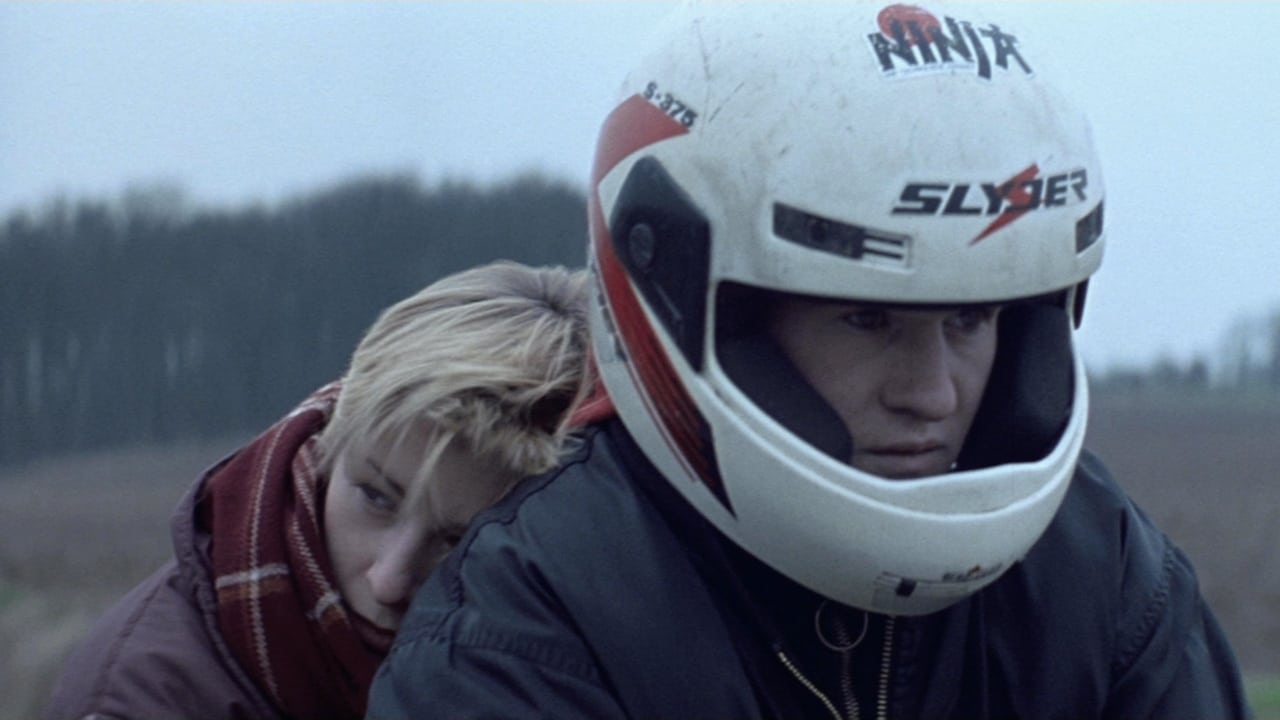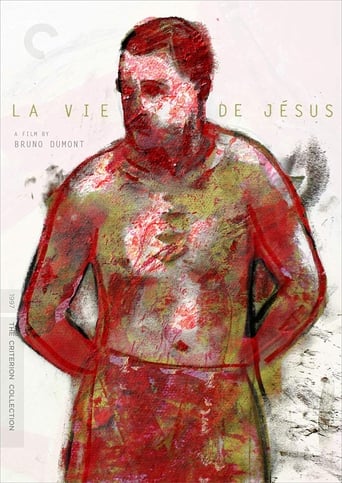

Whilst certain elements of Dumont's cinematic approach are commendable, the curiously titled La Vie de Jesus (1997) never really amounts to anything more than a series of laboured, social-realist clichés. As with his other films, such as L' Humanité (1999) and the recent Flanders (2006), we have the presentation of a series of slowly paced, deliberately structured and naturalistically rendered vignettes that propel the narrative - in this case, one that looks specifically at the issues of teenage delinquency, violence and alienation - whilst simultaneously creating a stark sense of drama from the seemingly mundane. As each scene is placed, one after the other, the broader implications of the story become apparent, and it is not until the end of the film that all the ideas become clear and we can think and reflect on the moral message that Dumont is seemingly presenting. However, for me, the film was so slight and seemingly without greater interpretation, that any attempt to really think about or feel this film were somewhat superfluous.For ninety minutes we follow around our central protagonist Freddy - an epileptic skin-head and motorcyclist - as he spends his days riding around the countryside with his gang, engaging in uninvolving sex with his girlfriend, or harassing the local Arab family. So we have elements of defiance, disappointment, littleness, jealousy, racism and more, all going into the creation of this suffocating pressure-cooker like environment that is never as successfully rendered as it possibly could be. I first saw the film back in 2002 when I was still in my late-teens and I found it somewhat disappointing, especially in the context of Dumont's second feature, the award-winning L' Humanité. I decided to re-investigate the film after having recently viewed the Shane Meadows film This is England (2006), which has a number of similar themes and overall scope. For me, both films are well acted, well directed and have an honesty to them that is rare and laudable, but for me personally, fell flat given the weak script and the overall clichéd subject matter.Some of the acting is highly impressive, particularly from Marjorie Cottreel as Freddy's put-upon young girlfriend, but David Douche as the central character occasionally comes across as a little stilted; obvious showing his limitation as a non-professional actor. However, despite these slight limitations, it is the overall mood of the film that eventually becomes the most problematic aspect. The film is so relentlessly grim and depressing, with no beacon of hope to cling to, that Dumont's ultimate message is buried beneath the misery. So much so in fact, that any moment of real dramatic tension is stifled, highlighting its own clichés and plunging the depths of third rate melodrama. Dumont would go on to improve his craft with the aforementioned L' Humanité, in which he drops the clichés and refines his characters to the point of real, searing interest. La Vie de Jesus isn't a complete failure; committed cinema goers will find some level of interest from the uncomplicated visual presentation and slow meditation on violence and guilt, however, too much of the film (for me) missed its target on almost every level.
... View MoreLa Vie de Jesus, a film by Bruno Dumont, is an unconventional look at marginal young people living in Bailleul in northern France. They spend their time without much purpose, riding around the drab Flanders town on motorbikes or playing in a marching band. From the opening of the film, I could sense that I was in the hands of a director with unique talent. One of Dumont's greatest strengths is his uncanny ability to capture the sense of emptiness of the town and the people who inhabit it. With little dialogue and no musical score other than the sounds of nature to break the stillness, we are forced to relate to the characters by observing their eyes, their physical movements, and the facial expressions that reveal an inner sadness. In La Vie de Jesus, unemployed, uneducated, and epileptic 20-year old Freddy (David Douche) lives with his mother Yvette (Genevieve Cottreel), a café owner. Douche gives a haunting performance as the sensitive but not very bright Freddy, his body scarred from repeated falls from his motorcycle and his face mirroring the fear of not knowing when his next epileptic seizure will come. Freddy has a girl friend, Marie (Marjorie Cottreel), who works as a cashier at the supermarket but their relationship lacks an emotional pull and their graphically depicted sex feels mechanical. Dumont does not judge his characters and they are fully three-dimensional, both guilty and innocent, displaying tenderness one minute and cruelty the next, searching for human connection. Freddy trains his finch to sing and takes the boy who just lost his brother to the beach to cheer him up, yet shortly afterwards he and his friends humiliate an overweight girl who plays in the band. One of the most moving scenes takes place at a hospital where the friends stand around a hospital bed watching one of the boys' brother who is dying of Aids. On the wall there is a picture of Jesus described as "about a guy who comes back to life". They do not talk but wait and watch silently and we wait with them as if expecting momentary redemption. Freddy and his friends are not "bad" people but each one is tightly wound, looking for a reason to explode and the film seethes with tension. When a young Arab boy Kader (Kader Chaatouf) foolishly tempts fate by making a play for Marie, the underlying racism of the society transforms an ordinary love story into a tragedy of transcendent power.
... View MoreThe north of France close to the Belgian border is a region contrasting with Belgium Flanders because the towns all seem to be inhabitated. You explore in the film by the camera of Bruno Dumont the non-experience of living in such a town where a love-affair with the only girl of the vicinity can develop into manslaughter when she is with somebody else. The drama of the movie is that youngsters in that region have no possibility to enjoy life because everything, the houses, the family, the people is so dull and there is no work. So they become red-necks on their motorcycle and terrorize by noise the people. The silence in this movie becomes significant because it means that the boys are confronted with their emptiness and their tedium. This gives them dangerous thoughts. This movie must end with something terrible and indeed everything is pointing in the direction of hate and jealousy.
... View MoreEach scene of this film grabs you. You want to *see* what is happening. As in Dumont's other film "L'Humanite", he has an intuitive grasp of what the viewer wants to see, where the human eye would naturally want to look. He is also a sensitive observer who understands human behavior in all its richness. Even though the main characters of his films are lowlives who we would probably not have much in common with, we appreciate them as human beings. He never makes fun of or degrades his characters. I disagree with the reviewer who said there is no development. I think there is a tremendous amount of development, but unlike a Hollywood film, he does not announce it with a surging musical score, a change in lighting, and other such cheap tricks. Instead, we observe a character moving beyond the grief of his brother's death when he bites off the knot of a mourning cloth he tied to his wrist. This is a great film by a great director.
... View More